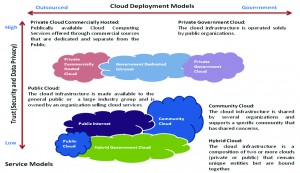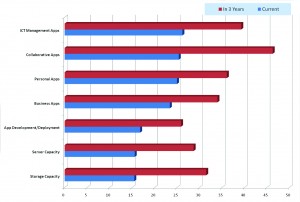By: Dr. Mohammed Yaseen
 Cloud computing is a recent revolution in the world of Information and Communication Technologies (ICTs) that enables a convenient way to share resources. It is model providing on-demand network access to configurable IT devices and services (e.g. Servers, Storage and Applications) gathered together as a network of computing resources located anywhere, being shared among its users.
Cloud computing is a recent revolution in the world of Information and Communication Technologies (ICTs) that enables a convenient way to share resources. It is model providing on-demand network access to configurable IT devices and services (e.g. Servers, Storage and Applications) gathered together as a network of computing resources located anywhere, being shared among its users.
International Data Corporation (IDC) estimates that roughly 10 percent of the approximately $69 billion spent on business applications worldwide during 2009 was spent on cloud computing applications, the growth rate over the next few years could be as high as 30 percent with analysts estimating that the global market for cloud computing services could reach $42 billion by 2012. Gartner predicts the global cloud marketplace as a more broadly defined, the firm predicts that the overall market for cloud services has already surpasses $40 billion, and will grow to over $150 billion annually by 2013.
Cloud computing deployment models cater the requirements of private entities, public organizations and general end-users. A private government cloud model is a deployment model is exclusively managed by public organizations where they may offer a number of services to general public or they may utilize the cloud for their own purposes by sharing the resources.
The philosophy of cloud computing in public sector can be illustrated by going back in time when every household, town or village use to have its own water well. Today, we observe shared public utilities giving us access to water by turning a tap installed inside our home; cloud computing for public sector works in a similar way.
Federal Government’s Information Technology (IT) environment is generally characterized by low asset utilization, duplicate resources, replication of systems and an environment which is difficult to manage. These inefficiencies at times negatively impact the Federal Government’s ability to serve general public through electronic means.
Cloud computing has the prospective to assist and play its role in reducing this lacking by improving government service delivery mechanism. The cloud computing model can significantly help public sector agencies struggling with the need to provide highly reliable, innovative services quickly despite resources limitation.
Commercial cloud service providers are expanding their offerings by including the entire IT stack of robust hardware and software infrastructure, middleware platforms, application system com¬ponents and software services. The private sector at large is taking advantage of the technology to implement effective resource utilization, increase service quality and increase efficiency. A survey carried out by IDC highlights the response of private sector entities intentions to adopt cloud computing in next three years. It can be seen clearly that the organizations are quite ready to utilize cloud services for all important resources.
Similarly, for the public sector cloud computing holds incredible possibilities to deliver public value by increasing operational effectiveness and responding faster to critical growing requirements. Several Governments on International arena have already started deploying clouds to avail the apparent opportunity to deliver public services and maximizing efficiency.
 In the United Kingdom, since 2009 government has created the “G cloud,” which is a government-wide cloud computing network. The Digital Britain initiative report issued jointly by the Department for Business Innovation & Skills and the Department for Culture, Media and Sport calls for government to take the lead in a wide-ranging digital strategy for the country. An important aspect of the Digital Britain strategy is to improve Government’s ICT infrastructure by allowing ser¬vices to migrate online. To support this IT procurement will be focused on enabling government to become a leading force in the use of cloud computing.
In the United Kingdom, since 2009 government has created the “G cloud,” which is a government-wide cloud computing network. The Digital Britain initiative report issued jointly by the Department for Business Innovation & Skills and the Department for Culture, Media and Sport calls for government to take the lead in a wide-ranging digital strategy for the country. An important aspect of the Digital Britain strategy is to improve Government’s ICT infrastructure by allowing ser¬vices to migrate online. To support this IT procurement will be focused on enabling government to become a leading force in the use of cloud computing.
In Japan, the Government is carrying out a major cloud computing initiative, tilted as the “Kasumigaseki Cloud”. The initiative targets to deploy a private cloud environment that would eventually host all of Govern¬ment computing needs. The cloud will allow for greater information and resource sharing and promote more standardization and consolidation in the government’s IT resources, according to Japan’s Ministry of Internal Affairs and Communications. The Kasumigaseki Cloud is part of the Digital Japan Creation Project. By consolidating all governmental IT under a single cloud infrastructure, the Japanese government believes it will not only reduce costs but would enable more “green,” environment friendly IT operations.
In Thailand, the Government Information Technology Service (GITS) is establishing a private cloud for use by Thai government agencies. The GITS has already established a cloud-based email service, and it plans to add SaaS offerings in the near future. GITS believes that such consolidation will improve service offerings for government agencies, while simultaneously cutting their overall IT costs “considerably”.
Exploring the prospects of cloud computing in Pakistan, one of the most difficult challenges faced by the government has been effective sharing of informa¬tion technology resources both at federal and provisional level. There have been broad efforts of developing core e-government programs, in areas such as public health/education and other services. Government has invested enormous effort and money into several programs with some notable success stories.
Cloud Computing brings an ideal platform for the public sector in bridging the missing link of connecting all federal ministries and departments under one platform to enhance information sharing as well as ensuring effective usage of IT resources to expand productivity. Information is the lifeblood of government, and decisions on how to manage that infor¬mation can have far-reaching political, social, and economic considerations.
Establishing shared services mechanism through dedicated private Government Cloud could support in transforming government and exploring ways that cloud computing could be applied to economic development, education, and healthcare delivery. Cloud computing offers an opportunity to be more efficient, agile, and innovative through more effective use of IT investments. Institutes with well-built data centre structure could be engaged in deploying a national public cloud. The upcoming era of staggering growth in IT-based communication and information sharing where every official task is likely to be performed over computers calls for implementation planning of cloud computing in public sector.
Advantages of public sector cloud may be even more visible in developing countries like ours that have not yet achieved sound level of public sector automation, lack legal requirement regarding data security and have limited availability of human resource with adequate ICT skills. On the positive side, developing countries face less opposition to new computing dynamics as compared to government agencies in developed countries. Cloud computing may enable us to leap towards new paradigm of government computing, avoiding many frazzled challenges faced.
 Another workable model to avail cloud computing as an emerging opportunity in the space of strengthening innovation in IT services could be development of Cloud Infrastructure at Universities with the help of public-private partnerships. In this regards, an already devoted pool of fund available with National R&D Fund Company may well be utilized along with development funds available with academia. Such projects would supply a strong baseline to tackle challenges related to privacy, standards, security, latency, interoperability, performance and reliability attached with further enhancement of scientific and technological knowledge inside society spheres.
Another workable model to avail cloud computing as an emerging opportunity in the space of strengthening innovation in IT services could be development of Cloud Infrastructure at Universities with the help of public-private partnerships. In this regards, an already devoted pool of fund available with National R&D Fund Company may well be utilized along with development funds available with academia. Such projects would supply a strong baseline to tackle challenges related to privacy, standards, security, latency, interoperability, performance and reliability attached with further enhancement of scientific and technological knowledge inside society spheres.
The availability of such cloud infrastructure at Universities will also provide a medium to encourage development of local content and applications related to various public and private sectors. The availability of a hosting platform over a cloud could be utilized by the local developers to supply their contribution to information-based society approach.
The benefits of cloud are already a reality for government organizations the world over. Governments can gain; employ proven values that early adopters have already gained. While adopting cloud computing model for service delivery, government could achieve low and optimized IT cost through virtualization, standardization and automation. Pubic cloud customization for particular workloads can accelerate delivery of services for automatic and faster compliance, rapid payback and productivity gains. Moreover, cloud computing can also assist to increase collaborating, share information, working in a more convenient way with citizens, increasing the ability to promote tele-work and avoiding duplication of resources.
The cloud computing deployment will eventually serve to transform on a large scale not only for private sector but IT in the public organizations as well. This will renovate not just how government interacts within itself but also the way the people interact with it. Cloud computing seems to be need of the hour for Governments across the globe as it will facilitate in achieving more openness and transparency. Developing countries have a more attractive case of adopting cloud solutions as they generally stand at the stage of infancy with respect to Government computation.
May 17, 2025











